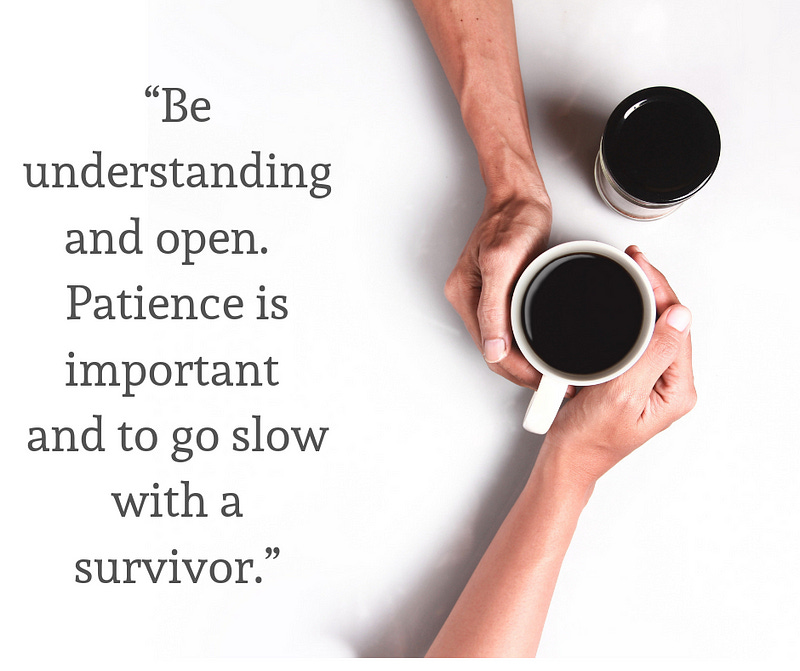The First, Best Thing Isn’t Your Belief
“I believe you,” isn’t the ideal response that you’ve been taught it is.
“I believe you,” isn’t the ideal response that you’ve been taught it is.
You want to do the right thing. And your friend/sister/partner may sense your willing spirit. They want to share their story without feeling judged. But they worry about being “too much”. In the past, they’ve been told to “get over it,” that they are making a “big deal” or are “too sensitive”. It happens a lot. You may know this. And you want to be different. But the first, best thing you can do for the sexual abuse survivor in your life isn’t to say “I believe you,”.
In the past, their experience hasn’t always mattered.
Friends looked away. Folks from church changed the subject. Family was silent. The facts of the abuse may have been the focal point, instead of the survivor’s experience. They may have been urged to press charges or make a complaint. Lawyers and law enforcement officials may have been involved.
Survivors have often felt the public outrage of their abuse but less their own power as a survivor.
Yet, survivors need to feel powerful. Power and control was taken from them in a painful way. Perhaps even more than once. Your “I believe you,” is a sentence that not only takes power away from them (again) but also ends their story. In a survivor’s re-telling, your task is to be present, to “hold space” for the conversation. Not engage in dialogue unless invited to. Allow the survivor to choose how their story ends. Being able to share freely, on their own terms without anyone else’s agenda taking precedent, is a rare experience. And one that can be exhilarating and restorative.
Consider also where your “I believe you,” comes from. Is it an answer from your gut? Or something canned? A formulaic response that you’ve been told you should say or maybe one that springs from the conversational quicksand you’re knee deep in. Rape disclosures are often uncomfortable. It’s natural to want the uncertainty and fear to go away. Every survivor I know gets that! We want it too. But recognize, also, those feelings are not about your survivor friend. They are about you.
“I believe you,” makes someone’s disclosure about you. This simple sentence, centers you in the conversation, not the survivor. When your response is about you, it means you have taken control of the conversation. You have the power and the potential to be in judgement. Of course, this was not your intention. Good intentions may be enough for the office but they aren’t worth a damn when it comes to interpersonal relationships. When it comes to the people we love, we need to do better.
No matter how hungry you are for connection, answers or closure, someone’s life is never available for your consumption.
The best, first thing you can do for a survivor is allow them to share on their own terms. This is hard. It may take years. And it may also never happen. It’s easier to barrel in, try to get at the whole story, to learn everything. We prize speed, productivity and checking things off on our to do lists across multiple devices. But relationships aren’t checkboxes. Especially not the ones that are most tender to us. They can’t be.
A time may come some day in your relationship with that survivor when your gut may press you to offer, “I believe you,”. And if it is truly your gut talking, go ahead and say it. But you may never get that feeling. And that is fine. By this time, the survivor will likely know you are one of her safe people. That he can depend on you. That your relationship with them is honest and healthy. And it’s at this point, too, that you will now know what they have known all along: the first thing isn’t always the easiest gift but it’s usually the best.
Elizabeth M. Johnson MA is a writer and podcaster based in Durham, North Carolina. She writes about trauma, relationships and how we make decisions. Sign up for her Substack here or be social @EMJWriting.





